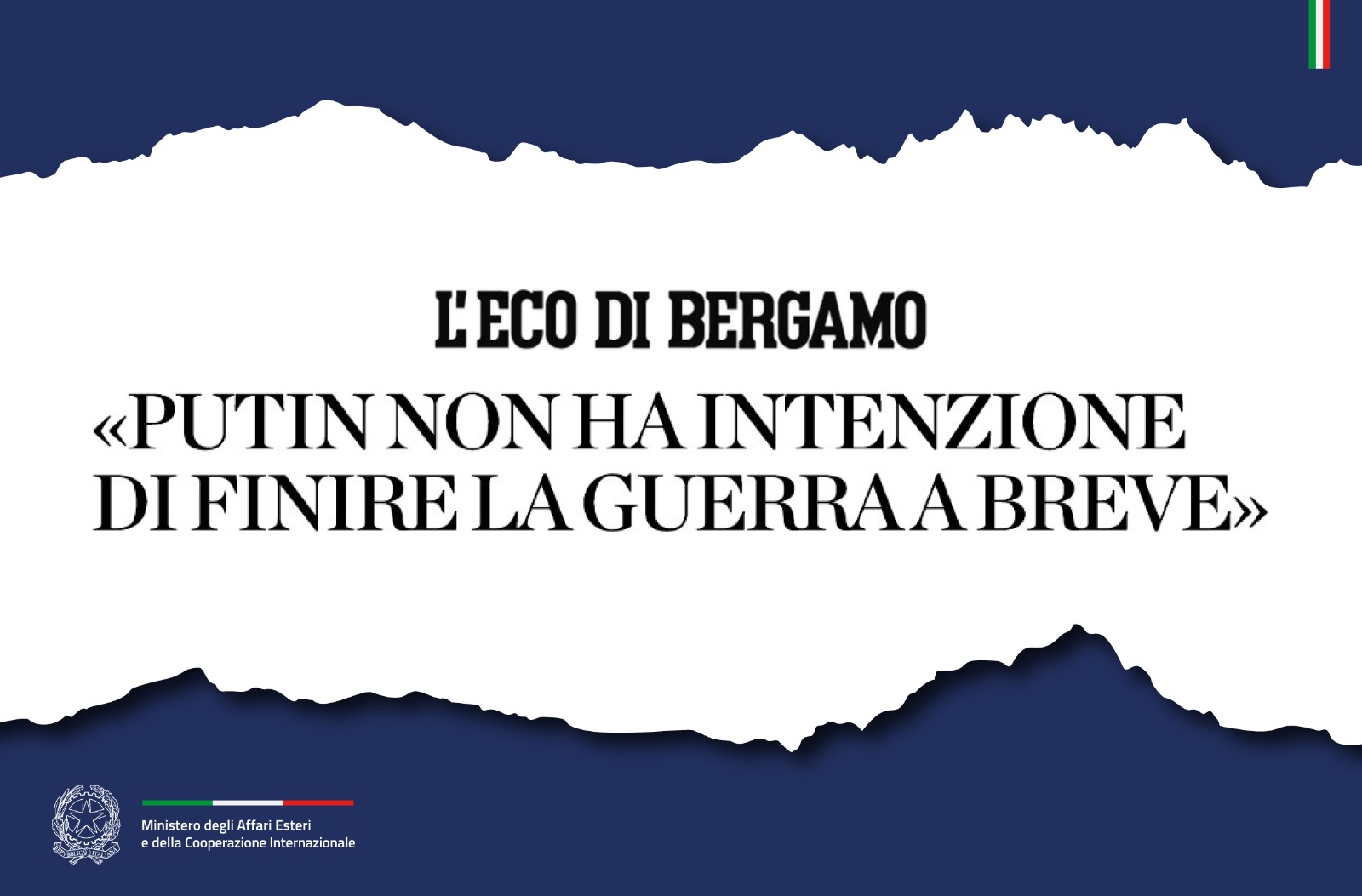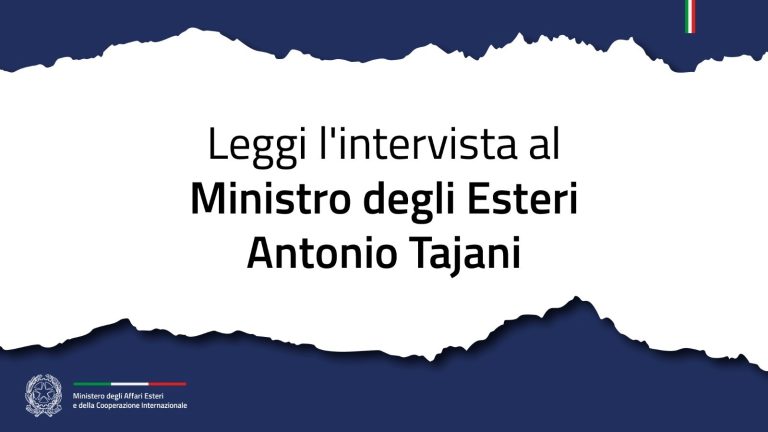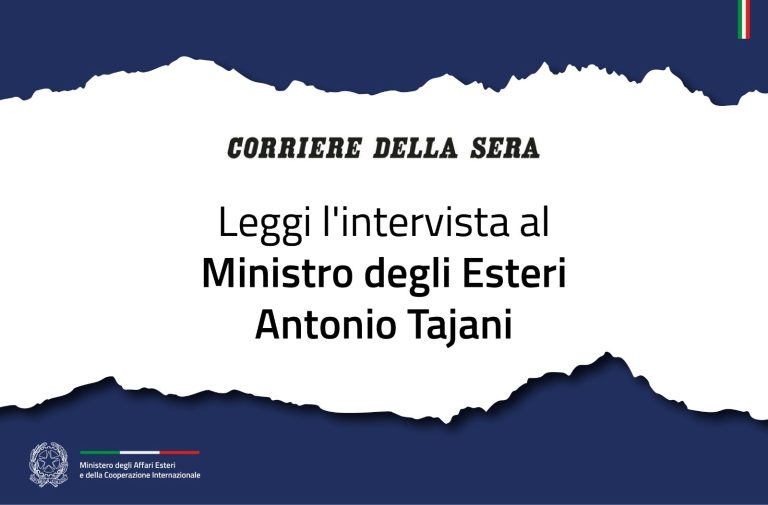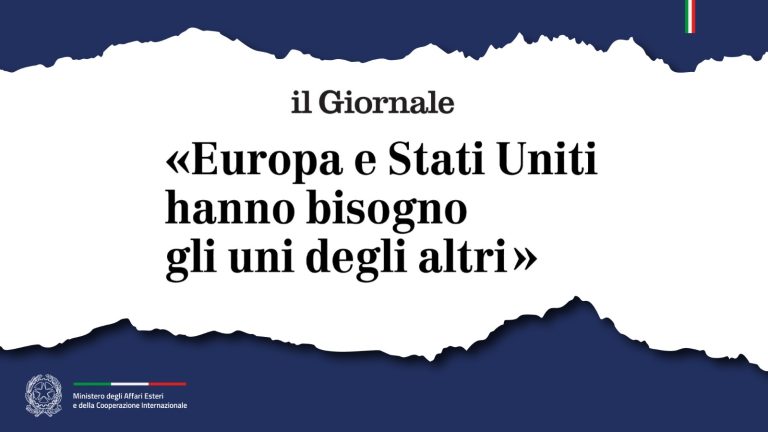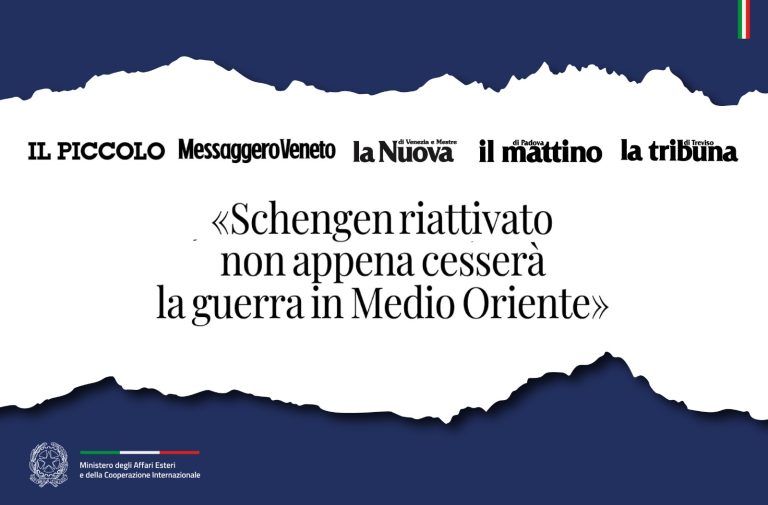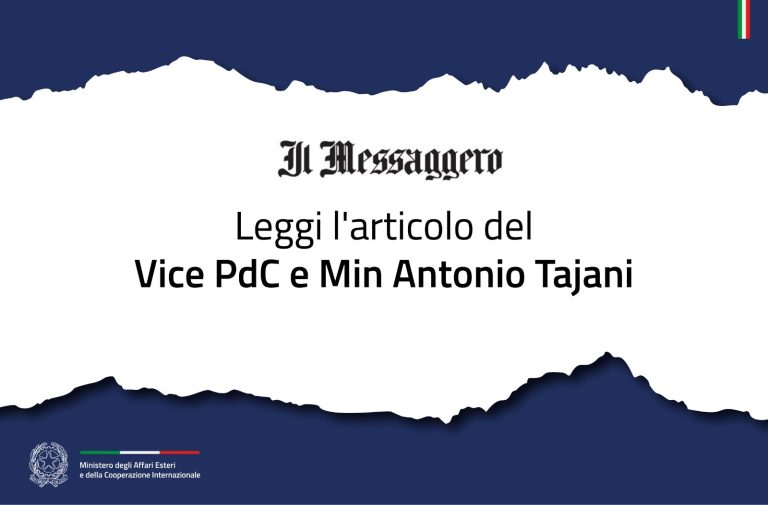“I’m a pragmatist”: That’s how Antonio Tajani defines himself in this interview with L’Eco di Bergamo, summarising his perspective as a combination of his roles as Deputy Prime Minister, Minister of Foreign Affairs, and leader of Forza Italia.
Let’s start with the suffering of the Palestinian population in Gaza.
“We’re doing everything we can on the diplomatic front, and it’s not easy. On the humanitarian side, we’ve brought over 700 Palestinians from Gaza to Italy, despite unimaginable difficulties. As the Palestinian Authority’s Minister of State for Foreign Affairs said, very few have done as much as us. Today (yesterday for readers), I visited a boy from Gaza in Bergamo Hospital who insisted on giving me an Italian flag he had drawn as a sign of gratitude, with the words ‘Thank you, Italy’. I was moved and am deeply grateful. Our job is to keep working for peace”.
But from Gaza to Ukraine, diplomacy doesn’t seem to be playing the main role.
“Diplomacy does – and must – do everything possible. In Gaza, even as we speak, there is determined work to reach a ceasefire, to relieve the suffering of the Palestinians, to secure the release of Israeli hostages, and we’re supporting negotiations between the United States and Iran to find a solution to the Iranian question. Regarding Ukraine, I don’t think Putin wants to end the war quickly. His soldiers, a million of them, earn more than double what a factory worker does, and Russia’s economy is now a war economy. It will take time to turn back, but it remains to be seen whether Putin will have the courage to do it – to become a man of peace”.
On these and other issues, are we seeing a thaw with Macron?
“France is a friendly country, the Quirinal Treaty is in force between us, and I am a pragmatist. We must engage in constructive dialogue with everyone. There may be differences, but everything gets clarified in the end. As for the ‘coalition of the willing’ to act as a peacekeeping force for Ukraine? Let’s talk about it when there’s an end to the conflict or a ceasefire. For now, it’s just rhetoric. If anything, we’re thinking about a UN-patrolled buffer zone. But discussions are still ongoing”.
Diplomatic solutions: do you think the Pope could give a positive push?
“Pope Leo XIV, with whom I spoke for a few minutes on the day of his inauguration, is a man of great stature – highly cultured, spiritual, and humble. I was struck by his first speech after being elected and I hope everyone fully understood it. His words about peace went beyond simply stopping hostilities – they touched on the transcendence of Christian peace. It was a clear, deeply spiritual message that I’m still reflecting on in my role as Minister of Foreign Affairs”.
Let’s move to domestic issues: your relationship with Salvini?
“I have an excellent personal relationship with Matteo Salvini, but we’re leaders of different parties. Forza Italia’s position is in the centre: Christian, liberal, reformist, pro-European. In Europe, we’re with the EPP, while Meloni and Salvini have other affiliations. The centre-right alliance isn’t about Europe – it’s about a political programme that prioritises jobs, economic growth, tackling irregular immigration, security, tax cuts, and supporting businesses. This three-party alliance allows us to broaden the base of support. And Forza Italia can grow by appealing to former Christian Democrats and former Socialists who used to vote for the PD but don’t identify with the Schlein-led leftward shift”.
Meanwhile, you lost in Genoa: postponed to the next regional elections?
“Genoa was a tough contest, but we did well in other local elections, including in Lombardy. I’m not worried about Forza Italia, though I’m not happy because I want to do more. That said, what really counts are the general elections – that’s where the overall picture emerges, and that’s what matters most. The centre-right is governing well in Lombardy, and the real test will be in the city of Milan, where Forza Italia will be decisive for victory. I’m convinced – and I repeat – that in Milan, a civic candidate can broaden the centre-right’s reach by involving civic movements and parties like Calenda’s”.
Let’s turn to the economy, while waiting for Trump’s tariffs.
“We don’t know how the dispute will end, but I’m optimistic we’ll find an agreement. We have to negotiate with the United States, and I’m determined to be positive. There’s no need to panic. I also have confidence in the skills of European Commissioner Šefčovič, who’s a friend of mine and is handling talks with Trump. We’re working to boost our exports by targeting many other markets. We’ve launched a government action plan that includes a chapter on India, where I was a month ago. In a few days, there will be a return visit with the Business Forum in Brescia, and there are many opportunities for us. Italy has 4 million businesses of all sizes, and our goal is to reach EUR 700 billion in exports within two and a half years – that is, by the end of this legislative term. You see, the government’s stability – which is recognised by everyone abroad – is a competitive asset because it gives businesses the certainty they need to plan for the future”.
In this context, why are you reforming the Ministry of Foreign Affairs?
“There will be a political arm and an economic arm. The Ministry’s new Directorate General for Economic Growth, together with the three public companies in the sector, will focus on exports, and our businesses will be able to turn to them. Italian embassies have already been mobilised. The Italian Foreign Ministry will become increasingly focused on economic matters”.
Let’s talk about the conditions contained in the golden power measures exercised by the government regarding the Unicredit-Banco BPM case, which concern Russia and have seen you critical of Minister Giorgetti.
“I’m in favour of the free market and I’m not cheering for anyone in particular. The doubts of the entire Forza Italia delegation about the legal basis were recorded in the minutes of the Council of Ministers meeting. The agreement, which corrected the original text, stipulates that any withdrawal of Unicredit from Russia must take place only after at least nine full months. Our priority is to defend Italian businesses, and in Russia – in full compliance with sanctions – there are 270 of our companies operating. If Unicredit leaves, it risks bringing everything down”.
You’ve gained some approval among entrepreneurs, but what about your relations with the unions?
“We have excellent relations with CISL, whose popular initiative bill on workers’ participation we supported, and with the independent unions (like Confsal). We don’t understand why CGIL and UIL won’t sign the health sector agreement that provides a pay rise for those workers. I don’t like a union that looks after the interests of union officials more than those of workers. We don’t believe in a legal minimum wage, which tends to push wages downwards – we prefer the idea of a ‘rich wage’. The European position is to favour collective bargaining agreements, and in Italy about 90% of workers are covered by them. The centre-right supports tax relief on overtime and productivity bonuses – that’s how wages can regain their purchasing power”.
The abstention option, expressed by the centre-right, regarding the five referendums in June – four of which concern labour – is sparking debate.
“In these types of referendums, there’s a quorum for participation, and consequently also a ‘non-quorum’. There’s freedom of choice, and I won’t be voting. In fact, this principle was also supported by President Napolitano and by Pannella, two major figures of the left and the referendum world”.

